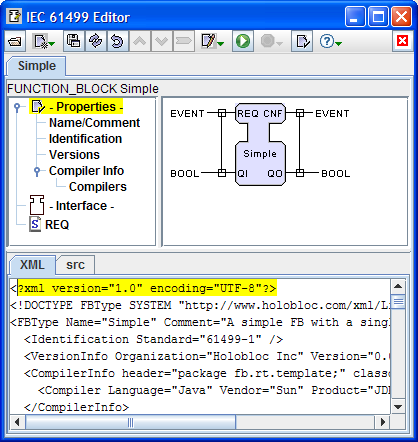
You can use the FBDK to build a subset of the simple
function block type described in Annex D.2 of IEC
61499-1:
- The event interface is restricted to a single REQ/CNF
pair.
- The body of the block is restricted to a single REQ
algorithm.
- Upon occurrence of an event at the REQ input, the REQ
algorithm is executed, following which an event is issued at the CNF
output.
These restrictions permit the
generation of somewhat more efficent runtime code, as well as
simplifying the programming of simple FB types.
To build a new simple FB type, use
the following steps:
- Start the FBEditor.
- Create a new simple FB type in the editor by clicking the
 New=> New=> FB Type=> FB Type=> Simple menu item, as shown at right. Simple menu item, as shown at right.
- Edit the function block's elements:
- Edit the FB type's properties.
- Be sure to enter package fb.rt.<mypkg>; in
the Compiler Info header field, where <mypkg>
is the name of the src subdirectory you are working in,
for example, student or book.
- Don't edit the classdef field; leave it saying SimpleFB.
- Edit the FB type's interface.
You won't be able to add or edit events, since only the REQ/CNF
pair is allowed.
- Double-click on the REQ algorithm in the Navigation
panel to bring up an editing dialog for
the algorithm.
- When your editing is complete, save your work with the
 Save As... button. Save As... button.
 It is a good idea to save your
work from time to time while editing, too! It is a good idea to save your
work from time to time while editing, too!
- Generate and compile a Java® source file with the
 Save As...
button. A dialog window will open showing the Java source text and
the compilation results. Save As...
button. A dialog window will open showing the Java source text and
the compilation results.
- Test the FB type by clicking
 Run
button. In the test window, you can set or clear the values of the
inputs, click on event input buttons and observe the resulting event
and variable outputs. Run
button. In the test window, you can set or clear the values of the
inputs, click on event input buttons and observe the resulting event
and variable outputs.
 If you change the code of the
block and recompile, you will have to exit the FBEditor application
and restart it in order to force a reload of the class file. If you change the code of the
block and recompile, you will have to exit the FBEditor application
and restart it in order to force a reload of the class file.
|

 New=>
New=> Simple menu item, as shown at right.
Simple menu item, as shown at right.
 It is a good idea to save your
work from time to time while editing, too!
It is a good idea to save your
work from time to time while editing, too! Run
button. In the test window, you can set or clear the values of the
inputs, click on event input buttons and observe the resulting event
and variable outputs.
Run
button. In the test window, you can set or clear the values of the
inputs, click on event input buttons and observe the resulting event
and variable outputs.